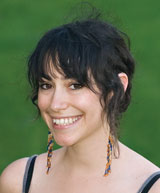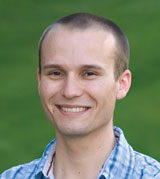Volume 25 · Number 4 · Summer 2008
New Student Movement

Abby Chroman
They lobby rather than demonstrate, write detailed proposals instead of lists of demands, and mobilize by teleconference calls, e-mail listserves, social networking Web sites, workshops and seminars, in addition to attending teach-ins.
Activists with the California Student Sustainability Coalition, including a number of UC Davis students, have been a polite but persistent force in nudging UC and other campuses to become more climate friendly.
The coalition was started in fall 2002 by students from UCLA, UC Berkeley and UC Davis. Beginning with the coalition’s first initiative, UC Go Solar — which led to adoption by regents in summer 2003 of green-building and clean-energy standards — activists have sought to work within the system.
With the coalition’s backing, UC has since expanded its sustainability policies to also include sustainable transportation practices, greenhouse-gas reductions, climate-protection practices, green-building renovations, sustainable operations and maintenance, waste reduction and environmentally preferable purchasing.
On a UC Sustainability Policies and Best Practices Web page, the coalition is listed as a campus sustainability resource.
At UC Davis, activists Bridgit Van Belleghem ’05, Scott Mueller ’05 and others worked with Associated Students, faculty, staff and administrators in creating an advisory committee and proposing a new administrative position to coordinate sustainability efforts.
Stan Nosek, who oversees UC Davis business operations as vice chancellor for administration, said those efforts worked so well that administrators started to look forward to hearing from coalition members.

Brian Seaby
“They have powerful things to say,” Nosek said. “They’ve put ideas on the table. . . . They have a passion for this. They understand how big organizations work, and they work within the system. As a result, I think it moved UC faster to a more broad commitment to sustainability than we might have otherwise.”
Already, this student movement has become a form of renewable energy itself — with students organizing each other and, a perennial challenge for any student group, keeping their organization alive after its founders graduate.
The consensus-building group has expanded to include chapters on California State University and community college campuses, in addition to most of the 10 UC campuses.
Nico Linesch ’07 attended one of the coalition networking “convergences” soon after enrolling at UC Davis in 2003 and has been active ever since. When he’s not working as a San Francisco transportation planner, he helps organize new coalition chapters.
“We’re not outside the regents meetings banging on drums and protesting,” Linesch said. “We’re trying to have a conversation. . . . It’s really working within the system rather than to be so much on the fringe that people stop listening to you.”

Jonathan Woolley '08
Abby Chroman, a UC Davis senior majoring in international relations, said she used to feel helpless about the plight of the planet — until she joined the coalition. “This is a way to stay more focused. I feel like I’m a part of the movement, rather than being isolated. I think it’s very easy to feel alone, and it’s impossible to take on the world if you’re alone.”
Chemical engineering senior Brian Seaby began attending a student-run sustainable-living lecture series soon after he transferred to UC Davis in 2006–07. Now, as a coalition member, he helps organize the Education for Sustainable Living Program, which, in addition to bringing speakers to UC Davis, also encourages students to work on campus sustainability projects. “We can’t continue on the path we’re on,” Seaby said.
Jonathan Woolley ’08, a master’s student in mechanical and aeronautical engineering, is one of two coalition members on the campus sustainability advisory committee.
“I haven’t owned a car in six years,” said Woolley, who grew up in Sacramento. “If I need to leave the Sacramento region, I take the train or I find a ride share. Living in Davis opened my mind a little bit more until I felt empowered to stand up and to ask others to change, too.”
Woolley and other students said they see sustainability as broader than environmentalism, also encompassing social and economic justice issues.
“It’s not a state that we somehow reach,” Woolley said. “It’s just being in balance and understanding how we interact with the world and making sure that the resources we have [today] we’ll have tomorrow.”
— Kathleen Holder
